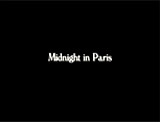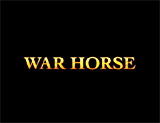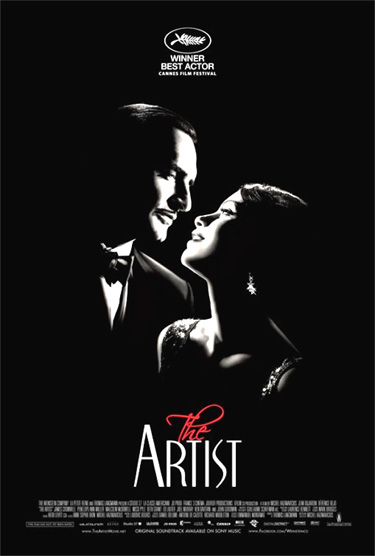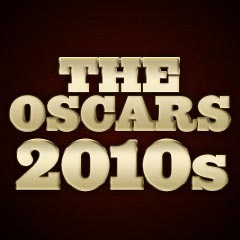2011
The winner is listed first, in CAPITAL letters.
|
Best Picture
|

|

|

|

|

|
|
THE ARTIST (2011, Fr.)
|
The Descendants (2011)
|
Extremely Loud & Incredibly Close (2011)
|
The Help (2011)
|
Hugo (2011)
|

|

|

|

|
|
|
Midnight in Paris (2011)
|
Moneyball (2011)
|
The Tree of Life (2011)
|
War Horse (2011)
|
|
|
Best Animated Feature Film
|

|

|

|

|

|
|
RANGO (2011)
|
A Cat in Paris (2011, Fr.) (aka Une Vie de
Chat)
|
Chico & Rita (2011, Sp./UK)
|
Kung Fu Panda 2: The Kaboom of Doom (2011)
|
Puss in Boots (2011)
|
Actor:
JEAN DUJARDIN in "The Artist,"Demián Bichir in "A
Better Life," George Clooney in "The Descendants,"
Gary Oldman in "Tinker Tailor Soldier Spy,"
Brad Pitt in "Moneyball"
Actress:
MERYL STREEP in "The Iron Lady," Glenn Close in "Albert
Nobbs," Viola Davis in "The Help," Rooney Mara in
"The Girl With the Dragon Tattoo," Michelle Williams
in "My Week With Marilyn"
Supporting Actor:
CHRISTOPHER PLUMMER in "Beginners," Kenneth Branagh in "My
Week with Marilyn," Jonah Hill in "Moneyball," Nick
Nolte in "Warrior," Max von Sydow in
"Extremely Loud & Incredibly Close"
Supporting Actress:
OCTAVIA SPENCER in "The Help," Bérénice
Bejo in "The Artist," Jessica Chastain in "The Help,"
Melissa McCarthy in "Bridesmaids," Janet McTeer in "Albert
Nobbs"
Director:
MICHEL HAZANAVICIUS for "The Artist," Alexander Payne
for "The Descendants,"
Martin Scorsese for "Hugo," Woody Allen for "Midnight
in Paris," Terrence Malick for "The Tree of Life"
 There
were 24 different categories in this year's Oscars race. In the
first year of Oscar presentations (for 1927/1928 films), there
were only 12 categories. This year's nine Best Picture
nominees in the top category included the most acclaimed and
awarded films of the year. There
were 24 different categories in this year's Oscars race. In the
first year of Oscar presentations (for 1927/1928 films), there
were only 12 categories. This year's nine Best Picture
nominees in the top category included the most acclaimed and
awarded films of the year.
- There were nine nominees for Best Picture, using
a new nomination process, announced in June of 2010. The Academy
of Motion Picture Arts and Sciences had once again changed
its Oscar's Best Picture nomination process for the second
time in three years. It followed a very brief, two-year period
in which the Best Picture field included 10 nominees, making
the choices extremely inclusive.
- The new system made the voters' ranking order
of favorite films more important. In the new nomination process,
Academy members were asked to rank five films for Best Picture
(rather than 10, as in the last two years). In order to acquire
a Best Picture nomination, a film had to earn at least 5% of
the total number of first-place votes (projected to be around
240 ballots), allowing for between five and 10 nominees.
- Nominees/Wins by Studio: The Weinstein Company
had 16 nominations (from 5 films) and 8 wins; Paramount had
18 nominations (from 6 films) and 6 wins; Buena Vista had 12
nominations (from 4 films) and 2 wins; while Sony Pictures
with 21 nominations (from 8 films) had only 3 wins.
The two top films, with a combined 21 nominations
and 10 Oscar wins, were both nostalgic odes to the history of
film-making and the early bygone days of cinema, followed by
a few other films also set in the past. Six of the nine Best
Picture nominees were adapted from literary works, and the top
two were both French-related, as was Woody Allen's nominee! The
two top films were also competing against each other in seven
categories.
The lineup of Best Picture nominees with their
wins (in descending order), are found below:
- The Artist (with 10 nominations and five
major wins: Best Picture, Best Actor, Best Director, Best Original
Score, and Best Costume Design), a low-budget, black and white
film with only $32.1 million (domestic) box-office, by French
director Michel Hazanavicius, a nearly-silent film from the
Weinstein Company that recalled the first-ever Best
Picture winner, Wings (1927/1928) - the only non-speaking
'Best Picture' in Academy history. [The Artist became
the second silent Best Picture winner in Oscar history.]
It was the first silent (almost) to be nominated for Best Picture
since Ernst Lubitsch's The Patriot (1928/1929). [Note: The
Patriot was the only silent film among the five
nominees of its year, and the last silent film to receive
a Best Picture nomination, over 80 years ago. The last fully
B&W Best Picture winner was The
Apartment (1960).]
- Hugo (with 11 nominations and five wins,
in technical categories: Best Cinematography, Best Art Direction,
Best Visual Effects, Best Sound Mixing, and Best Sound Editing,
with no performance nominations), by director Martin Scorsese
(with his 7th Best Director nomination), a 3-D family adventure
film from Paramount; it was a 12 year-old orphan boy (Asa Butterfield)
story set in 1930s Paris at the Gare Montparnasse train station
(with mechanical wonders) where the boy (son of a late master
clockmaker) tried to repair a broken mechanical man and unlock
its secret, with homage to pioneering French silent film director
Georges Melies (Ben Kingsley)
- The Descendants (with 5 nominations,
and only one win for Best Adapted Screenplay), by director
Alexander Payne, an emotional, sometimes melancholy family
drama set in Hawaii, based on the best-selling novel by Kaui
Hart Hemmings, about an indifferent husband and father of two
girls who was forced to re-examine his past and embrace his
future when his wife suffered a boating accident off of Waikiki
- The Help (with 4 nominations, including
three performance nominations and only one win for Best Supporting
Actress), by writer/director Tate Taylor, an ensemble film
and an adaptation of Kathryn Stockett's best-selling novel
about "the help" during the 1960s civil rights-era
in Mississippi
- Midnight in Paris (with 4 nominations,
and one win for Best Original Screenplay), by director-nominated
Woody Allen, a Parisian romantic fantasy from the 1920s from
Sony Pictures, the top-grossing film of Woody Allen's career
(to date $56 million domestic and $148.3 million worldwide)
- his 41st feature film. Allen's Oscar win for Best Original
Screenplay was his third Original Screenplay Oscar, following
wins for Annie Hall (1977) and Hannah
and Her Sisters (1986) 25 years earlier - and it was Allen's
fourth overall Oscar (out of 23 nominations). [Note: The only
times Allen has won the Original Screenplay Oscar has been
when his films were also nominated for Best Picture. In addition,
Allen was the oldest winner of the Best Original Screenplay
award, at age 76.]
- Moneyball (with 6 nominations and no
wins), from Sony Pictures, by un-nominated director Bennett
Miller, an inside-baseball biographical sports drama based
on Michael Lewis' 2003 book regarding a true story - the 2002
season of the Oakland A's baseball team [Note: the six nominations
were the most for any baseball movie since The Pride of
the Yankees (1942) received 11 nominations; no baseball
film has ever won Best Picture, and the last baseball film
to be nominated for the top award was Field
of Dreams (1989) (with three nominations).]
- War Horse (with 6 nominations and no
wins), by director Steven Spielberg, a beautifully-filmed,
old-fashioned WWI war-time epic drama, about an English farm
boy who joined the army to search for his horse Joey after
it was sold into the cavalry and shipped to France during the
war
- The Tree of Life (with 3 nominations
and no wins), by Terrence Malick, an esoteric, experimental,
non-linear family chronicle of life in 1950s small-town Texas
- Extremely Loud & Incredibly Close (with
2 nominations and no wins), by director Stephen Daldry, a surprise
last-minute nomination for the poignant, sentimental post-9/11
drama about a 9 year-old boy coping with the grief of losing
his father
Only one of the Best Picture nominees had earned
more than $100 million at the box-office at the time of nominations
and awards, Buena Vista's The Help, at $169.6 million. The
Artist at $32.1 million, the front-running winning film joined
the low-ranking films of the previous two years, The Hurt
Locker (2009) (at $17 million) and The King's Speech (2010) (at
$135 million), and it was on track to be the second lowest-grossing
Best Picture winner since The Last Emperor (1987) (at
$44 million). Hugo was also low-grossing at $69.5 million.
The films of all of the five nominees for Best
Director were also nominated for Best Picture. All of the Best
Director nominees were males (unlike two years previously when
Kathryn Bigelow won for the category), and all were veterans,
except for 44 year-old Michel Hazanavicius, who won the Best
Director Oscar for The Artist. It was his first nomination
(and win), and the first for a French director. The other four
nominees were:
- 69 year-old Martin Scorsese, with his 7th Best
Director nomination, and a previous win for The Departed
(2006)
- 76 year-old Woody Allen, with his 7th Best Director
nomination, and a previous win for Annie
Hall (1977)
- Terrence Malick, who had received two previous
nominations for The Thin Red Line (1998) (Best Adapted
Screenplay and Best Director)
- Alexander Payne (with his second Best Director
nomination) was previously nominated as Best Director for Sideways
(2004) (he won the Oscar for Best Adapted Screenplay for
the film).
The Iranian family drama from writer/director Asghar
Farhadi, A Separation had two nominations (including Best
Original Screenplay) and won the Best Foreign Language Film Oscar
- it was the first Iranian film to be nominated (and also win)
in Academy history.
The Best Animated Feature Film category included
two non-CGI (hand-drawn) animated nominees - a pair of unlikely
and obscure, foreign-language independent film candidates from
the small New York distributor GKIDS. The winner was Rango,
director Gore Verbinski's Western comedy-adventure (with voice
of Johnny Depp as chameleon Rango), Verbinski's first nomination
(and win) after being overlooked for his live action films. The
other nominees (conspicuously without a Pixar nominee or winner)
were:
- A Cat in Paris (Fr.) (aka Une Vie De chat),
non-CGI animation, about young traumatized and unspeaking Parisian
girl Zoe and her cat Dino (and rooftop cat burglar Nico) -
an exciting mystery thriller unfolding over the course of one
evening
- Chico & Rita, by Spanish filmmaker
Fernando Trueba, an old-fashioned, hand-drawn animated tale
of star-crossed love in the 1940s-1950s with a jazzy (Latino-Cuban)
soundtrack, between young jazz pianist Chico
& beautiful singer Rita
- Kung Fu Panda 2, from DreamWorks, the
blockbuster sequel to the 2008 film, the highest-grossing animated
film of the year, directed by Jennifer Yuh Nelson
- Puss in Boots, from DreamWorks, from
director Chris Miller, a spin-off sequel to the Shrek
film franchise - the first spin-off nominee in the
category
There were nine first-time nominees among the 20
performance nominees - the most newcomers were within the Best
Supporting Actress category.
The Best Actor category included two long-time
favorite nominees (Clooney and Pitt), but neither of them triumphed.
The category was won by a first-time nominee - and the first French
actor to ever win Best Actor - 39 year-old French actor Jean
Dujardin (with his first nomination and win) for his performance
in The Artist, as declining, handsome silent film star
George Valentin struggling with the coming of talkies. The other
four Best Actor nominees were:
- 48 year-old Mexican actor and underdog Demián
Bichir (with his first nomination) for director Chris Weitz'
illegal immigrant drama A Better Life, as East L.A.
gardener Carlos Galindo, while coping with his teenaged son
lured by local gangs
- 50 year-old George Clooney (with his third Best
Actor nomination, and 6th Oscar nomination overall, with one
win for Syriana (2005) for Best Supporting Actor) for The
Descendants, as middle-aged father of two daughters and
Honolulu-based lawyer Matt King coping with his cheating wife's
coma [Note: Clooney was also nominated for
Best Adapted Screenplay for his own directed film, The Ides
of March (its sole nomination)]
- 53 year-old English actor Gary Oldman (with
his first nomination) for director Tomas Alfredson's UK espionage
film Tinker Tailor Soldier Spy (with three nominations
and no wins), an adaptation of the John Le Carré novel,
as British intelligence agent George Smiley hunting for a Soviet
mole in the 1970s
- 48 year-old Brad Pitt for Moneyball (with
his third Oscar nomination overall and second Best Actor nomination,
with no wins), as Oakland A's general manager Billy Beane
The Best Actress category included two legendary
veterans (one without any wins from six nominations, and the
other with her 17th nomination), and only one first-time nominee.
Two actresses in the category, Glenn Close and Meryl Streep have
competed against each other in the Best Actress category twice
before (in 1987 and 1988), and on the two previous occasions
both lost (to Moonstruck (1987) and Cher, and to The
Accused (1988) and Jodi Foster).
This time in an upset, 62 year-old Meryl Streep
won her third Oscar (it was with her record-setting 17th Oscar
nomination, five more than both second-place Katharine Hepburn
and Jack Nicholson, and she already possessed 13 Best Actress
nominations), for her performance in The Iron Lady (with
two nominations, and two wins including Best Makeup), a biopic
by director Phyllida Lloyd, as former UK Prime Minister Margaret
Thatcher. She had two previous Oscars for Best Supporting Actress
for Kramer vs. Kramer (1979) and Best Actress for Sophie's
Choice (1982). [Note: Streep hadn't won an Oscar in the last
12 instances, stretching back to 1982]. The other Best Actress
nominees were:
- 64 year-old Glenn Close (with her 6th Oscar
nomination overall and her third Best Actress nomination, with
no wins - her last nomination was 23 years earlier) for director
Rodrigo Garcia's Albert Nobbs (with three nominations
and no wins), as title character Albert Nobbs, a hotel waiter
trapped after masquerading as a man in late 19th century and
early 20th century Ireland
- 46 year-old African-American stage actress Viola
Davis (with her 2nd Oscar nomination overall, previously nominated
as Best Supporting Actress for Doubt (2008) opposite
co-star Meryl Streep, with no wins) for The Help, as
middle-aged, stoic, headstrong black servant-maid Aibileen
Clark (one of "the Help") in Jackson, Mississippi
in the early 1960s during the Civil Rights era, who shared
her experiences, from her point of view, with aspiring writer
Eugenia "Skeeter"
Phelan (Emma Stone) for an anonymously-published book, The
Help
- 26 year-old Rooney Mara (with her first nomination)
for The Girl With the Dragon Tattoo (with five nominations
total and only one win for Best Film Editing), an R-rated thriller-remake
by un-nominated director David Fincher and based on Stieg Larsson's Millennium book
series, as violent, bisexual computer hacker misfit Lisbeth
Salander assisting Mikael Blomkvist (Daniel Craig) in an investigation
into the possible murder of a missing girl
- 31 year-old Michelle Williams (with her third
Oscar nomination and second nomination for Best Actress, with
no wins) for My Week With Marilyn (with two nominations
and no wins), by UK director Simon Curtis, as bombshell movie
legend Marilyn Monroe, a fragile screen beauty during the troubled
making of the film The Prince and the Showgirl (1957) with
Laurence Olivier
The Best Supporting Actor category was notable
for having only one nominated actor under 50 years of age (there
were two 82 year-old nominees, some of the oldest on record),
and all nominees had never won an Oscar. The winner in the category
was the favorite - 82 year-old Canadian-born Christopher Plummer
(with his second Best Supporting Actor nomination and his first
Oscar win), for Beginners (the film's sole nomination
and win), a romantic comedy-drama by director/writer Mike Mills,
as 75 year-old Hal Fields, a dying, terminally-ill widower who
came out of the closet to his adult son. With his win, Plummer
became the oldest actor to win an Oscar. He also became
the oldest person to win an Academy Award in one of the four
acting categories. The other nominees in the category were:
- 51 year-old British actor Kenneth Branagh (with
his 5th Oscar nomination overall, and first Best Supporting
Actor nomination, with no wins) for My Week with Marilyn,
as acting legend Sir Laurence Olivier
- 28 year-old Jonah Hill (with his first nomination)
for Moneyball, as numbers-crunching assistant GM Peter
Brand assisting Oakland A's general manager Billy Beane (Brad
Pitt) with statistics
- 70 year-old Nick Nolte (with his 3rd Oscar nomination
overall after two Best Actor noms in 1991 and 1998, with no
wins) for Warrior (the underappreciated film's sole
nomination), a sports-action drama by director Gavin O'Connor,
as raspy-voiced, troubled but recovering alcoholic Paddy Conlon
dealing with his two martial-arts competing sons (estranged
brothers) (Tom Hardy and Joel Edgerton)
- 82 year-old Max von Sydow (with his 2nd Oscar
nomination overall, following a Best Actor nomination in 1988,
with no wins) for Extremely Loud & Incredibly Close,
as the unnamed character called The Renter, who offered support
non-verbally (through a notepad and a 'yes' and 'no' on his
palms) to precocious child protagonist (Thomas Horn)
The Best Supporting Actress category had only one
returning Oscar nominee and four first-time nominees. The category
was won by 41 year-old African-American actress Octavia Spencer
(with her first nomination) for The Help, as black 'help'
maid and talented chef/pie-maker Minny Jackson. The other Best
Supporting Actress nominees were:
- 35 year-old Argentine-French actress Bérénice
Bejo (the wife of the film's director) (with her first nomination)
for The Artist, as silent film fan and rising female
star-ingenue Peppy Miller
- 30 year-old Jessica Chastain (with her first
nomination) for The Help, as 'white trash' bottle blonde
Celia Foote from an impoverished background, married to Johnny
Foote (Mike Vogel), and the naive employer of smart-mouthed
black maid/cook Minny Jackson (fellow-nominee Octavia Spencer)
- 41 year-old Melissa McCarthy (with her first
nomination) for the ribald comedy Bridesmaids, as sex-hungry,
raunchy and obnoxious future sister-in-law bridesmaid Megan
[Note: It has been rare in Academy history to have nominations
for comedies, and especially female comedic roles.]
- 50 year-old British actress Janet McTeer (with
one previous Best Actress nomination in 1999, with no wins)
for Albert Nobbs, as Hubert Page, a cross-dressing woman
passing as a man (a housepainter who was married to another
woman); he was a kindred spirit and inspirational role model
for co-star Albert Nobbs (Glenn Close)
Oscar Snubs and Omissions:
- Tilda Swinton for director Lynne Ramsay's We
Need to Talk About Kevin, as Kevin's (Ezra Miller) deeply-troubled,
psychopathic mother Eva Khatchadourian of a murderous child
- Michael Fassbender for director Steve McQueen's
NC-17 rated UK drama Shame, as sex-addict Brandon Sullivan
- Leonardo di Caprio for director Clint Eastwood's
biopic J. Edgar (without nominations), as FBI head J.
Edgar Hoover
- Shailene Woodley for The Descendants,
as 17 year-old daughter Alexandra ("Alex"), who revealed
that her dying comatose mother Elizabeth was having an affair
- David Fincher, the un-nominated director of The
Girl With the Dragon Tattoo, also devoid of a Best Picture
nomination
- Andy Serkis, as lead ape Caesar, a performance-capture
role in Rise of the
Planet of the Apes
- Albert Brooks and Ryan Gosling for the violent
action-drama heist thriller Drive (with only one nomination
Best Sound Editing), as villainous mobster Bernie Rose, and
as the unnamed Driver
- Ryan Gosling, shut out of a nomination for his
role as deputy campaign manager Stephen Meyers in the George
Clooney-directed political thriller The Ides of March (with
only one nomination, Best Adapted Screenplay)
- Charlize Theron for director Jason Reitman's
dark comedy Young Adult (without nominations), as self-absorbed,
unapologetic divorced late 30s ghost writer Mavis Gary; also
co-star and stand-up comic Patton Oswalt wasn't nominated as
crippled, sad loner Matt Freehauf
- Best Original Screenplay nominations for Diablo
Cody's Young Adult, and Terrence Malick's The Tree
of Life
- The finale of the long-running Harry
Potter film franchise, Harry
Potter and the Deathly Hallows, Part 2, the highest-grossing
film of 2011, came up without a Best Picture or Best Adapted
Screenplay nomination; however it did receive nominations
for Best Visual Effects, Best Makeup, and Best Art Direction
- Two high-profile animated films lost out as
nominees in the Best Animated Feature Film category: Disney/Pixar's Cars
2, the sequel to the 2008 film (this effectively ended
Pixar's long-streak of over a decade), and director Steven
Spielberg's The Adventures of Tintin, a performance
motion-capture 3-D film based on the Tintin series of
comic books
- director Paul Feig's (and producer Judd Apatow)
gross-out wedding comedy Bridesmaids was lacking a Best
Picture nomination, although it was one of the biggest, mainstream,
popular box-office hits of the year. The picture received two
nominations: one for Melissa McCarthy who was recognized with
a Best Supporting Actress nomination, and co-writer/co-star
Kristen Wiig also received a Best Original Screenplay nomination
- the directorial debut of actress Angelina Jolie
for In the Land of Blood and Honey was considered as
a strong Foreign Language Film contender, but it wasn't to
be
|

![]()